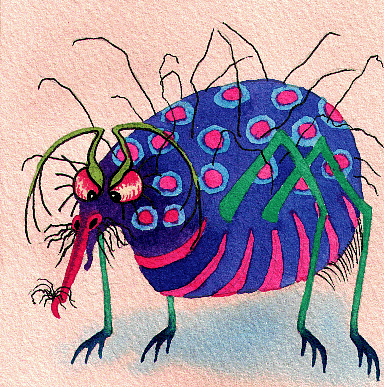Germ #14
by Warron Prentice.
When I saw the above painting, the first thing I thought of was the poem, The Microbe. This is another poem that I was introduced to by Gene Wilder when he starred in Willy Wonka and the Chocolate Factory (1971), except he quoted the last two lines of this poem instead of the first two as he did for yesterday's poem. (Has anyone noticed how that particular film is crammed with brief quotes from lots of fabulous poetry? And the film made learning this poetry so painless, too). Anyway, this particular poem is a rather inaccurate and out-of-date description of a bacterium, but I am sure that you -- and especially my blog sibling, Tara -- will enjoy it anyway!
The Microbe
by Hilaire Belloc
The microbe is so very small
You cannot make him out at all.
But many sanguine people hope
To see him down a microscope.
His jointed tongue that lies beneath
A hundred curious rows of teeth;
His seven tufted tail with lots
Of lovely pink and purple spots
On each of which a pattern stands,
Composed of forty separate bands;
His eyebrows of a tender green;
All these have never yet been seen -
But Scientists, who ought to know,
Assure us they must be so ...
Oh! let us never, never doubt
What nobody is sure about!
From More Beasts for Worse Children (1900).
- Log in to post comments


It's a good poem, and I've liked it for a long time, but there's something about the last 5 lines that makes me uncomfortable. Doubting things that have never yet been seen is an important part of science, but the last 5 lines seem to parody science by portraying scientists as never doubting features of a creature they have never seen.
Probably that's just a knee-jerk reaction come from having read too many anti-science screeds...
hrm, i see your point. but when i read it, i think of those particular scientists whose entire careers were/are based on a scientific fiction, yet who refuse to accept other, more accurate, explanations for the data when confronted with them. i don't think of this poem as an indictment of science in general, i think it is more specifically aimed than that.
but i could be wrong: it wouldn't be the first time.
I love the picture and the poem. The thing about poetry, is that some poems are better left un-analyzed, but some don't make sense, or cannot be appreciated fully, unless one analyzes them.
In this case, I tend to agree with llewelly, that there may be an anti-scientist bias. But that impression comes from living in today's society, in which there is a lot of anti-science sentiment. I think that, in order to know if the anti-science message was intended by the author, we would have to know more about Belloc and his philosophical tendencies.
He was born shortly after the publication of Origin of Species, was a noted satirist, and apparently often wrote from a Catholic perspective. Does that mean he was anti-science? I don't know.
Sometimes I say: "The unexamined life is not worth living, but the over-examined life is pretty damn boring."
heh, thanks joseph. it is entirely possible that this poem is anti-science, although as you point out, it is good to remember that it was written more than 100 years ago by a catholic. but i still think of it as a more specific warning against falling in love with your own hypothesis and therefore not testing it as rigorously as it should be tested.
Thank you for pointing out a cautionary interpretation. It's certainly more appealing, and perhaps even useful as a mental device. Having read your cautionary interpretation, I can now also see a similar anti-pseudoscience interpretation.
I like Ogden Nash's "Common Cold":
http://www.cs.rice.edu/~ssiyer/minstrels/poems/325.html
Ogden Nash had another one as well:
http://torch.cs.dal.ca/~johnston/poetry/germ.html
which I remember recited by my Father on most any occasion someone was ill.
LM Wanderer
i almost used the germ, instead.